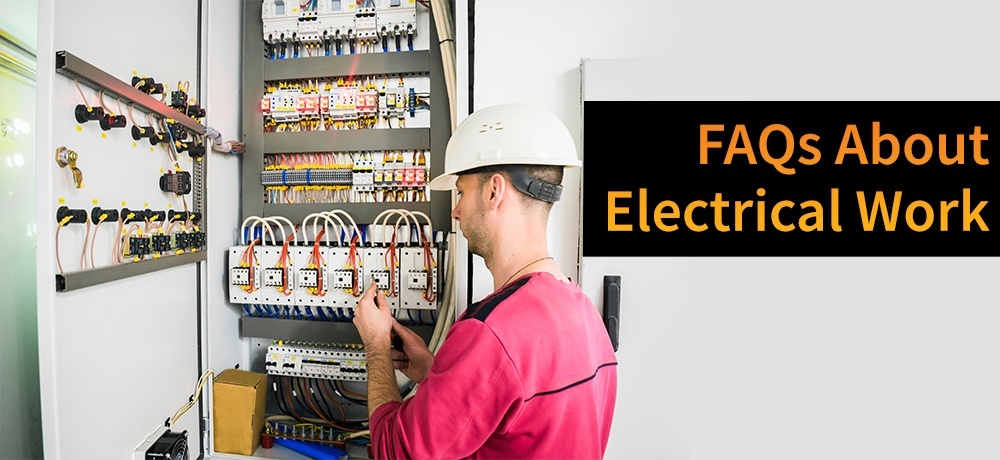Frequently Asked Questions About Electrical Work

A home’s wiring and electrical work are not to be trifled with unless you’re an experienced professional. However, there are times where knowledge about how electrical systems work could prevent a fire hazard or an emergency. Unfortunately, when it comes to electrical work, clients have a ton of questions but often find answers difficult to come by.
At H MAN ELECTRIC, we believe in educating our clients and to help them be more aware, we have answered some of the most frequently asked questions about electrical work and wiring.
1. Why do my lights flicker?
If all the lights in your home, or in part of your home, start flickering all at once, this can indicate power arcing, which is a potentially dangerous problem that occurs when current jumps between small gaps in wire connections. The arcing sucks power, which explains the flickering lights, and generates heat, which presents a serious electrical fire hazard.
2. How can I tell what is tripping my circuit breaker?
Sometimes, it isn’t merely a matter of flipping the switches back on to get your power working again. If you reset the circuits, only to have the breaker trip again, it is likely that you have a problem that needs to be addressed by a qualified electrician. If there’s a burning smell coming from the box, then the lines are overloaded, and you shouldn’t try to fix anything yourself.
3. How many GFCI plugs do I need to have in my house?
You must have GFCI (ground-fault circuit interrupter) protected plugs in the garage (with some exceptions), in the bathroom, on the kitchen countertop, within six feet of a sink and for any outdoor plugs.
4. Do I need an electrical permit for the work I am having done by a licensed electrician?
Yes! When any product (plug, switch, light fixture) is being altered or replaced by a licensed electrician, they must have an electrical permit to do the work. The cost of the permit varies by jurisdiction, and in some instances, the electrician can use a minor label permit when the work is small enough to fulfill the minor label requirements. Therefore, a permit can cost anywhere between $30 and $300 depending on where you live and how much work you are having done.
5. What is the most energy-efficient lighting for my house?
By far the most energy-efficient lighting available right now is LED. Many people look to fluorescent lighting as the best energy efficient solution, but they have a very bright white light that reminds people of an office or hospital setting rather than a warm, comfortable home. Also, all fluorescent lamps contain a small amount of mercury and require special handling for disposal and clean up in the event one breaks. The standard incandescent bulb is not as energy efficient as LED or fluorescent, but you can reduce the energy used by installing dimmer switches on lights in common areas and bedrooms. This allows you to change the feeling of the room by merely dimming down or lightening up a room with the switch. There are many times you do not need to have the lights in your rooms turned up to full capacity, so dim them down and you will have a nicer ambiance and will not be using as much energy at the same time!
6. To save on costs, should I buy the parts and hire an electrician to install them?
While it may be tempting to go to your local hardware or home improvement store and buy all the parts you need instead of having the electrician purchase them, you are going to be missing an essential element. The electrician will not warranty the parts you buy yourself. This means that if you buy the parts and have the electrician install them, then something goes wrong with the part within the first year, it will be your responsibility to buy a new part and hire the electrician to install the new part. If you let the electrician purchase the parts from the outset of your project, they will warranty the parts so if something goes wrong in the first year, they will come out and replace the part free of charge.
7. Why is recessed lighting better?
a. Pot-lights offer your home a clean, modern and streamlined lighting style.
b. You can install them virtually anywhere without fear of making a fashion faux-pas.
c. Pot-lights or other recessed lights highlight the room.
d. You can literally install recessed lighting anywhere!
e. Recessed lighting is also commonly used overtop kitchen counters, outdoors and within furniture.
8. Is aluminum wiring a fire hazard or is my aluminum wiring safe?
Aluminum wiring was used in the late 1960’s and into the mid-1970’s in many homes across North America. Aluminum wiring itself is not dangerous to have in your house. The issue with aluminum wiring is in faulty terminations either in receptacles and switches, or light fixtures and equipment. Due to expansion and contraction of the conductor itself and the fact that aluminum will oxidize over time, heat can be generated at points where the aluminum wiring is improperly terminated. One of the main issues with aluminum wiring is that while everything may appear fine with your wiring, it could be deteriorating behind devices, creating a dangerous fire hazard. If you have concerns about aluminum wiring in your home or business, you should have it inspected by a licensed electrician who has experience working with aluminum wiring.
If you have any more questions about electrical work and wiring, get in touch with the experts at H MAN ELECTRIC. As the best-certified commercial and residential electricians in Toronto and GTA, we offer timely and cost-effective electrical design, installation and repair in your condominium or anywhere at your house that you need. To learn more about how we can help you, please click here or contact us by clicking here.